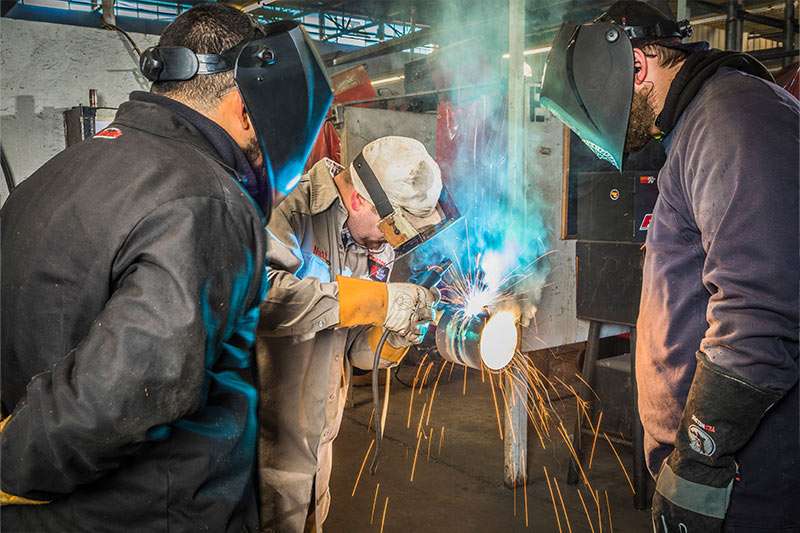TWS is a Great Training Option for Everyone
Learn more about how we can prepare you to advance your career.
Are you new to welding and considering becoming a welder? Have some questions that will help you make the decision to start a career in welding? The good news is that we have the answer to some of the common questions.
Welding Students FAQs
As a new welding student, it’s natural to have questions. The good news is that we’re here to provide the answers you need. Here are five common questions asked by new welding students, and we’re confident that our responses will help you choose welding as a career.
Question #1: What is Welding?
Welding is the joining of two metals with heat in a fabrication process. It uses high heat to melt a base metal with the addition of filler materials. When the metal pool cools, it creates a joint, strengthening the base metal.
Question #2: What Are Some Common Welding Joints?
Welders learn different types of welding joints, they include:
Have You Considered a Career in the Skilled Trades?
Fill out the form to recieve a no obligation info packet.
Butt Joint – two pieces of metal are welded together on the same plane and the weld joins the metal at the sides.
Tee Joint – joining two pieces of metal in a T shape at a 90-degree angle.
Corner Joint – joining two pieces of metal at their ends.
Lap Joint – two pieces of metal are welded by placing them in an overlapping pattern on top of each other.
Edge Joint – the metal surfaces are placed together so the edges are even. One or more of the metal pieces may be bent at an angle.
Question #3: What are Some Common Welds?
As a new welding student, you should know some of the common welds. They include:
Slot Weld – a joint between two overlapping parts.
Plug Weld – using a filler metal to join one part to another part overlapping through a hole.
Spot Weld – welding metal together without using filler material.
Fillet Weld – a weld of triangular cross sections joining two surfaces at right angles to each other.
Flash Weld – the ends of the metal are pressed together and welded.
Question #4: What are the Most Common Welding Methods?
During the Welding program curriculum, you will learn in the classroom and try these welding methods in our welding booths. The most common welding methods include:
Gas Metal Arc Welding (GMAW) – also known as MIG welding, gas metal arc welding uses a thin wire electrode to weld metals like copper, stainless steel, and nickel.
Gas Tungsten Arc Welding (GTAW) – also known as TIG welding, used for welding thin and non-ferrous metals like aluminum, copper, lead and nickel. Gas tungsten arc welding uses a non-consumable tungsten electrode.
Shield Metal Arc Welding (SMAW) – also known as stick welding, shielded metal arc welding uses a flux-coated electrode consumable. It is a high quality and low-cost welding process.
Flux Cored Arc Welding (FCAW) – uses a continuous feeding wire during the weld but uses a shielding gas and self-shielding agent.
Question #5: How Do You Become a Welder?
Attending the Welding Training program at Tulsa Welding School is a great way to become a welder. In as little as 7 months, you can become a welder apprentice and have a solid foundation to build upon throughout your career. Tulsa Welding School has campuses in Tulsa, OK, Jacksonville, FL, and Houston and the Dallas Metro, TX. You will learn what it is like to be a welder during interactive workshop courses and while using welding booths. You will train in structural, fluxcore, and pipe welding. We will also prepare you for the job search with resume building, and interview and certification exam preparation.
Want to Learn More?
The Professional Welder program at Tulsa Welding School’s Jacksonville campus starts by helping you know what it’s like to be a welder in interactive workshop courses and welding booths. You’ll be trained in structural, flux core, and pipe welding in as little as seven months. You’ll also be prepared to excel in job interviews and welding tests for various certifications.
Read about the types of welding careers you can pursue with your skills. Ready to start a Professional Welding program? Contact us today about our welding certification preparation program.







